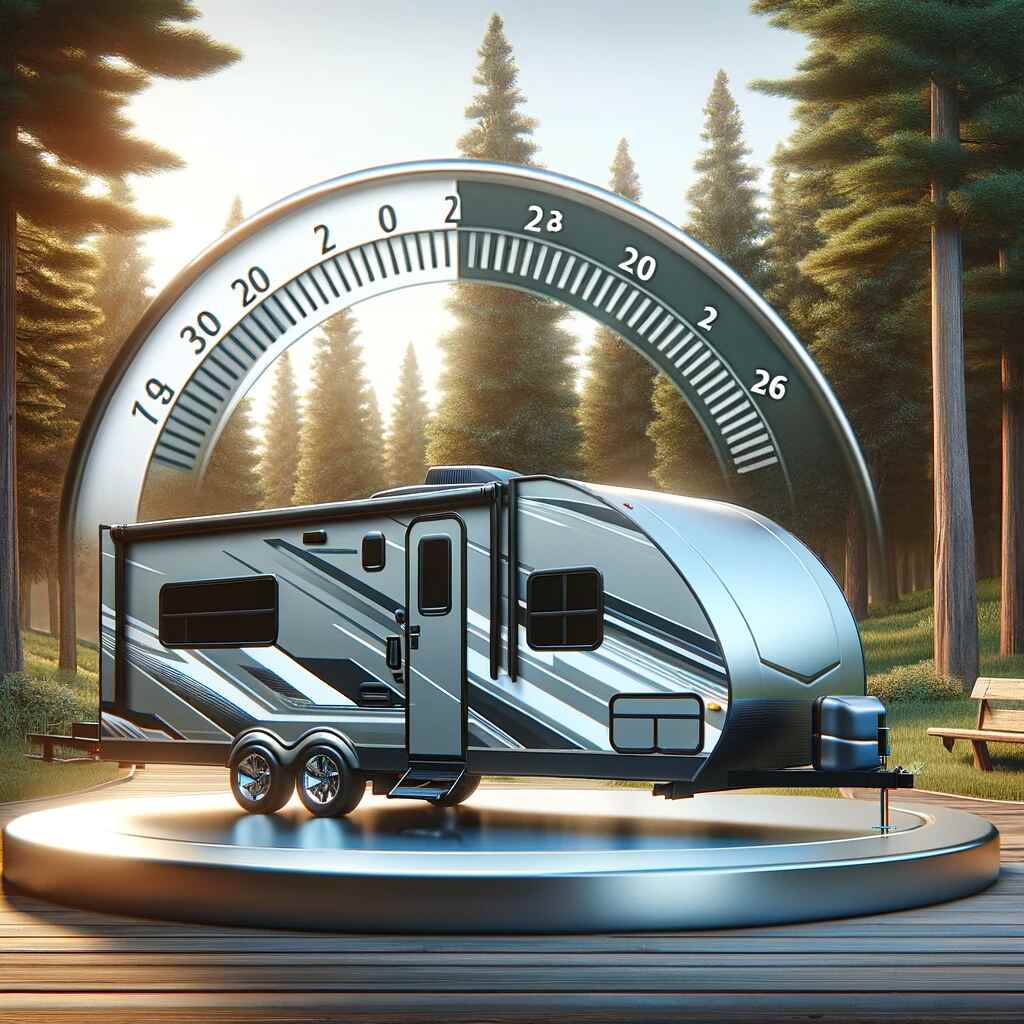When it comes to embarking on a road trip or camping adventure, having the right travel trailer can make all the difference. For many travelers, a 27-foot travel trailer strikes the perfect balance between comfort and maneuverability. However, one crucial aspect that often comes into play when selecting a travel trailer is its weight. Understanding the average weight of a 27-foot travel trailer is essential for planning your trip, choosing the right towing vehicle, and ensuring a safe and enjoyable journey.
The average weight of a 27-foot travel trailer typically falls within the range of 5,000 to 7,000 pounds. However, this weight can vary based on factors such as construction materials, amenities, cargo, and water tanks. It’s crucial to consider your towing vehicle’s capacity and ensure proper weight distribution for safe and enjoyable travels.
In this comprehensive guide, we will dive deep into 27-foot travel trailer weight, exploring the factors that influence it, and providing insights into selecting the right trailer for your needs.
The Basics of a 27-Foot Travel Trailer
Before we dive into the specifics of weight, let’s first establish what a 27-foot travel trailer is and what makes it such a popular choice among travelers.
What is a 27-Foot Travel Trailer?
A 27-foot travel trailer is a type of recreational vehicle (RV) designed for camping and road trips. These trailers are typically 27 feet in length, measured from the front hitch to the rear bumper. They are known for offering a comfortable and spacious interior while still being relatively easy to tow and maneuver compared to larger RVs.
27-foot travel trailers are available in various floor plans and configurations, with amenities that can include sleeping quarters, kitchens, bathrooms, and living areas. They offer the convenience of a home on wheels, making them an attractive option for those who love exploring the great outdoors without sacrificing modern comforts.
Popular Features of 27-Foot Travel Trailers
- Spacious Living Areas: Despite their relatively compact size, 27-foot travel trailers are designed to make the most of their interior space. Many models feature slide-out sections that expand the living area when parked, providing ample room for relaxation.
- Amenities: These trailers often come equipped with a range of amenities, including a fully functional kitchen with appliances, a bathroom with shower facilities, comfortable sleeping quarters, and entertainment systems.
- Towing Friendliness: One of the significant advantages of a 27-foot travel trailer is its ease of towing compared to larger RVs. Many mid-sized trucks and SUVs can handle the weight, making it accessible to a broader range of travelers.
Now that we have a better understanding of what a 27-foot travel trailer is, let’s move on to the core topic of this article: their weight.
How Much Does a 27-Foot Travel Trailer Weigh?
When considering a travel trailer for your adventures, understanding its weight is crucial for several reasons. The weight of the trailer not only affects your choice of towing vehicle but also impacts your safety on the road and the overall travel experience.
Factors Affecting the Weight of a 27-Foot Travel Trailer
The weight of a 27-foot travel trailer can vary significantly based on several factors. It’s important to consider these factors when determining the total weight of your trailer:
- Construction Materials: The materials used in the construction of the trailer play a significant role in its weight. For example, trailers made with lightweight aluminum frames and fiberglass exteriors tend to be lighter than those constructed with heavier materials.
- Amenities and Features: The level of luxury and convenience amenities in the trailer can add to its weight. Trailers with more extensive kitchen setups, multiple slide-outs, and larger bathrooms will generally weigh more than simpler models.
- Water and Propane Tanks: The weight of water and propane tanks can be substantial. A fully filled freshwater tank, gray water tank, and propane tanks can significantly increase the trailer’s overall weight.
- Cargo and Personal Items: The weight of your personal belongings and camping gear also contributes to the total weight. It’s essential to account for this when estimating the trailer’s weight.
- Axle Configuration: The number of axles and their capacity can influence the trailer’s weight-bearing capability. Trailers with dual axles can generally carry more weight than single-axle models.
- Slide-Outs: Slide-outs, which expand the interior living space, add weight to the trailer. The more slide-outs a trailer has, the heavier it is likely to be.
Average Weight of a 27-Foot Travel Trailer
While the weight of a 27-foot travel trailer can vary, the average weight typically falls within the range of 5,000 to 7,000 pounds (2,268 to 3,175 kilograms). However, it’s essential to note that this is just a general guideline, and specific trailer models may deviate from this average.
To provide a more accurate estimate, let’s break down the different components that contribute to the weight of a 27-foot travel trailer:
- Base Weight: The base weight of the trailer, without any added options or cargo, typically ranges from 4,000 to 6,000 pounds (1,814 to 2,722 kilograms).
- Cargo and Personal Items: Depending on your camping gear, supplies, and personal items, you can add an additional 1,000 to 2,000 pounds (454 to 907 kilograms) to the trailer’s weight.
- Water and Propane Tanks: Filled freshwater tanks can weigh around 8.3 pounds per gallon (3.8 kilograms per liter). Most 27-foot travel trailers have freshwater tanks with capacities ranging from 30 to 60 gallons, which can add 250 to 500 pounds (113 to 227 kilograms). Propane tanks, when full, can weigh approximately 20 pounds (9 kilograms) each.
- Slide-Outs: If your trailer has slide-outs, each one can add an extra 800 to 1,000 pounds (363 to 454 kilograms).
- Amenities and Upgrades: The presence of extra amenities like a larger refrigerator, air conditioning units, or entertainment systems can contribute to the trailer’s weight.
- Tongue Weight: The tongue weight, which is the force exerted by the trailer on the towing vehicle’s hitch, should also be considered. It typically ranges from 10% to 15% of the trailer’s total weight.
Keep in mind that these numbers are approximate and can vary from one trailer model to another. To get an accurate weight for a specific trailer, consult the manufacturer’s specifications or weigh the trailer at a certified scale.
Towing a 27-Foot Travel Trailer
Now that you have a better understanding of the average weight of a 27-foot travel trailer, let’s explore the important considerations when it comes to towing one.
Towing Capacity of Your Vehicle
Before you even think about hitching a travel trailer, it’s crucial to know the towing capacity of your vehicle. Towing capacity refers to the maximum weight that your vehicle can safely tow. Exceeding this limit can lead to accidents, damage to your vehicle, and compromised safety on the road.
To find out your vehicle’s towing capacity, consult the owner’s manual or contact the manufacturer. Keep in mind that towing capacities can vary significantly among different vehicles, even within the same make and model, based on factors such as engine size, transmission type, and optional towing packages.
Calculating the Tongue Weight
The tongue weight of your trailer is another critical factor to consider. It’s important to maintain proper tongue weight to ensure stable towing and safe handling. As mentioned earlier, tongue weight typically falls within the range of 10% to 15% of the trailer’s total weight.
To calculate the recommended tongue weight for your trailer, simply multiply the trailer’s total weight by 0.1 (for 10%) or 0.15 (for 15%). For example, if your 27-foot travel trailer weighs 6,000 pounds, the recommended tongue weight would be between 600 and 900 pounds.
Properly distributing the cargo inside the trailer can help you achieve the desired tongue weight. Be sure to consult your trailer’s user manual for specific guidelines on loading and weight distribution.
Hitching and Towing Safety Tips
When it comes to towing a 27-foot travel trailer, safety should always be a top priority. Here are some essential tips to ensure a safe towing experience:
- Select the Right Hitch: Choose an appropriate hitch system for your towing vehicle. Weight distribution hitches and sway control systems can help improve stability and control while towing.
- Practice Backing Up: Towing a trailer, especially a larger one like a 27-footer, can be challenging when it comes to backing up. Practice in an empty parking lot or open area to improve your skills.
- Check Tires Regularly: Ensure that the tires on both your towing vehicle and trailer are properly inflated and in good condition. Underinflated or damaged tires can lead to blowouts and accidents.
- Plan Your Route: Consider the route you’ll be taking and be aware of any steep inclines, narrow roads, or low clearance bridges that may pose challenges for towing.
- Drive Cautiously: Drive at a safe and manageable speed, especially on highways and unfamiliar roads. Keep a safe following distance and use your mirrors to monitor traffic around you.
- Brake Gradually: When slowing down or coming to a stop, apply the trailer brakes gradually to avoid skidding or jackknifing.
- Be Mindful of Wind: High-profile vehicles like travel trailers are more susceptible to wind resistance. Be cautious when driving in strong winds, and reduce speed if necessary.
- Perform Regular Maintenance: Keep both your towing vehicle and travel trailer in good working condition. Regular maintenance checks can prevent unexpected breakdowns.
Choosing the Right 27-Foot Travel Trailer
Now that you have a good grasp of the weight considerations and towing essentials for a 27-foot travel trailer, it’s time to explore how to choose the right trailer for your needs and preferences.
Consider Your Lifestyle
Your choice of a travel trailer should align with your camping style and needs. Here are some questions to help you determine the ideal trailer for you:
- How many people will be traveling with you?
- Do you prefer a more rustic camping experience or one with all the modern comforts?
- What types of destinations do you plan to visit? (e.g., campgrounds, national parks, remote locations)
- How often do you plan to use the trailer?
Floor Plan and Layout
Travel trailers come in various floor plans and layouts to suit different preferences. Some common options include:
- Rear Bedroom: A bedroom located at the rear of the trailer, often with a queen or king-sized bed.
- Bunkhouse: Ideal for families, this layout features bunk beds for children or additional guests.
- Front Kitchen: A layout that places the kitchen at the front of the trailer, often with large windows and extra counter space.
- Slide-Outs: Consider whether you want one or more slide-outs to expand the interior space when parked.
- Bathroom: Some trailers have full bathrooms with showers and toilets, while others have smaller wet baths or restroom facilities.
Budget Considerations
Your budget will play a significant role in determining the options available to you. Travel trailers can range from affordable basic models to high-end luxury units. Be sure to factor in not only the purchase price but also ongoing expenses like insurance, maintenance, and campground fees.
Research and Compare Models
To make an informed decision, research different trailer models from reputable manufacturers. Look for user reviews, visit dealerships, and attend RV shows to get a firsthand look at the trailers you’re interested in.
New vs. Used
Consider whether you want to buy a new or used trailer. While new trailers come with warranties and the latest features, used trailers can offer cost savings. Ensure that any used trailer you consider is thoroughly inspected for any hidden issues.
Tow Vehicle Compatibility
As discussed earlier, your towing vehicle’s capacity should match the trailer’s weight. If you already own a towing vehicle, make sure it can safely tow your chosen trailer. If not, you may need to factor in the cost of upgrading your vehicle.
Dealership Services
When purchasing a travel trailer, consider the services offered by the dealership. These can include financing options, warranties, maintenance services, and assistance with RV accessories.
Conclusion
In conclusion, the average weight of a 27-foot travel trailer typically falls within the 5,000 to 7,000 pounds range. However, it’s crucial to remember that this weight can vary based on various factors, including construction materials, amenities, cargo, and water tanks. To ensure a safe and enjoyable journey, it’s vital to understand your towing vehicle’s capacity, calculate tongue weight accurately, and choose a trailer that aligns with your specific needs and preferences.
Armed with this knowledge, you can make an informed decision, allowing you to embark on your camping adventures with confidence, comfort, and peace of mind.










